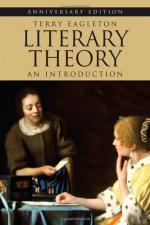
|
| Name: _________________________ | Period: ___________________ |
This quiz consists of 5 multiple choice and 5 short answer questions through Chapter 2, Phenomenology, Hermeneutics, Reception Theory.
Multiple Choice Questions
1. What novel by John Updike does Eagleton discuss from the position of reception theory?
(a) Terrorist.
(b) Couples.
(c) Of the Farm.
(d) Rabbit Run.
2. What "twin impacts" does Eagleton cite in the mid-Victorian period that was particularly worrisome to the ruling class?
(a) Scientific discovery and social change.
(b) Religious ideology and social statis.
(c) Religious ideology and social change.
(d) Scientific discovery and religious ideology.
3. For the economist Eagleton discusses, "those economists who dislike theory or claimed to get along better without it" were what?
(a) Had no knowledge of any theory.
(b) In the grip of the most current theory.
(c) In the grip of an older theory.
(d) Didn't understand the importance of theory.
4. According to Eagleton, the approaches outlined in his book have implications where?
(a) Well beyond literature.
(b) Well beyond language.
(c) Well beyond feeling.
(d) Well beyond politics.
5. For Eagleton, hostility toward theory means what?
(a) Opposition to other people's theories.
(b) Opposition to other people's theories and oblivion of one's own.
(c) Acceptance to some people's theories and protective of one's own.
(d) Acceptance to some people's theories.
Short Answer Questions
1. The distinction between fact and fiction in defining literature is what?
2. During the 1960s, what kind of students began to enter higher education that broke down assumptions about literary studies?
3. For Eagleton, how did the romantics usher a "forestalling of reasoned critical enquiry"?
4. What is the name of the critic from the Constance school of reception aesthetics and the author of "The Act of Reading" who Eagleton discusses at length?
5. Both F.R. Leavis and Edmund Husserl seek to grasp the thing in itself, or the ______for Husserl and ______for Leavis.
|
This section contains 363 words (approx. 2 pages at 300 words per page) |

|




